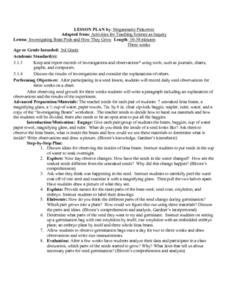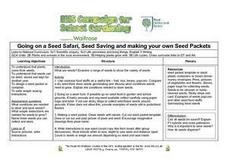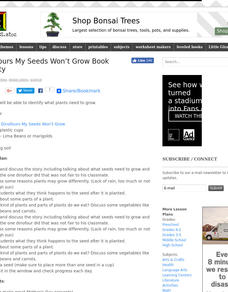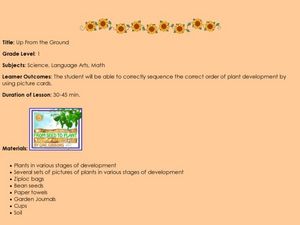Curated OER
Growing a Seed
Seeing how seeds grow into plants is such an enjoyable for students! They plant lima bean seeds and take pictures to record the growth of their plants. Students write in a journal to describe their daily observations of their plants, and...
Curated OER
What Does Your Bean Seed Look Like Today?-- Class Bar Graph
For this math/science worksheet, students who are already beginning to grow a bean seed record what it looks like on a given day. Detailed pictures of different growth stages are provided on the class graph.
Agriculture in the Classroom
Seed Match
Using this resource, your team of green thumbs discuss why plants are a part of a healthy diet and the different ways they are used in daily life. They then observe the characteristics of different seed as they attempt to match...
Curated OER
All About Seeds!
First graders learn all about seeds. In this biology lesson, 1st graders discover: what a fruit is, what is inside of seeds, and how seeds are transported.
Curated OER
Investigating Bean Pods and How They Grow
Third graders observe and create a record of seed growth over time. After planting a seed, 3rd graders record their observations of the seed's growth over a three week period. Upon conclusion of the experiment, they write a paragraph...
Curated OER
Seed Types
Students dissect seeds. In this seed dissection lesson, students discover the anatomy of seeds. After dissecting seeds, students hypothesize and design the perfect seed to survive in a dry forest.
Curated OER
Incredible Seeds
Second graders are given a group of seeds and put in small groups. They classify their seeds based on their observations with 90% accuracy. Students draw a picture of each seed showing at least 2 characteristics of each. They write 1...
Curated OER
How Does a Seed Grow Into a Plant?
Second graders explore how seeds grow into plants. They discuss types of seeds and place seeds in wet paper towels to germinate. They draw a picture in their journal to record their observations for four days. They take pictures of their...
Curated OER
Children's Literature Across the Curriculum Ideas: The Magic School Bus Plants Seeds
Students read The Magic School Bus Plants Seeds by Janna Cole. They complete a variety of cross-curricular activities surrounding the study of plants and seeds. Included are reading, art, math, science, writing, social studies, and...
Curated OER
Going on a Seed Safari
Students describe biology by identifying different plants in class. In this seed lesson, students discuss the process of how a plant grows from seed to leaves. Students attend a field trip to their garden or another park and collect a...
Curated OER
Seed Surprises
Students investigate seeds and their growth. In this agriculture lesson, students read the book How a Seed Grows and discuss the seed cycle. Students examine real seeds and identify their properties. Students create a set of sequencing...
Curated OER
What is the Function of Each Seed Part in the Growth of a Plant
Sixth graders investigate the parts of a seed by using a digital camera. In this botany lesson, 6th graders plant their own seeds in class and demonstrate the necessary attributes for growing a plant. Students utilize a...
Curated OER
Dinofours My Seeds Won't Grow
Young scholars listen to a read aloud, Dinofours My Seeds Won't Grow. They talk about what plants need to grow and study the parts of plants. They discuss what types of plants we eat after which they plant a seed in order to observe the...
Curated OER
Jack and the Beanstalk: Plant a Bean and Watch It Grow
Young scholars plant bean seeds, watch them grow, and measure them with non-standard objects. They describe the bean's growth in a journal and record the growth on a calendar.
Curated OER
Growing Seeds Indoors: What is the difference?
In this dicot and monocot seeds worksheet, learners read the difference between the two types of seeds and draw a picture, make a poster, and use the internet to find more research on them. Students complete 3 tasks.
Curated OER
Up From the Ground
First graders sequence the development of a plant. In this plant life lesson plan, 1st graders listen to a story about how a plant grows, students view a PowerPoint presentation and learn new vocabulary. Finally, students sequence the...
Curated OER
See How They Grow: Plants And Their Parts
Students discuss what plants require in order to grow, identify plant parts and their functions and discuss a video about plants. They conduct a controlled experiment with bean seeds and then record and observe the bean plants.
Curated OER
The ee Sound
When two vowels take a walk, the first one does the talking! Scholars see this motto put to use as they study the /ee/ sound in various spelling patterns. Learners read a short introduction on this concept before reading several example...
Perkins School for the Blind
Counting in Tactile Journals
This is one of those great ideas I totally love. Youngsters with visual impairments practice counting and left-to -right sequencing by counting out a set number of edible objects from the left and putting them in a bag on the right. They...
Curated OER
Dried Vs. Soaked Beans
Students observe the differences between a dry and soaked bean, and identify the functions and parts of a bean at the beginning of its growth.
Curated OER
Jack and the Beanstalk
Third graders read a story and grow a beanstalk. In this literature and life science lesson, the class reads "Jack and the Beanstalk," then lists fairy tale elements and write a puppet show. The students plant pinto beans and observes...
Curated OER
Plant Growth
Third graders keep a journal and record the growth of their plant everyday over a two week period. With an observation written down for everyday of the week, they draw a picture of their plant in their journal on Monday and Friday...
Curated OER
Safe Or Sorry-- Risky And Non- Risky Lunch Box Choices
In this health worksheet, students discover that some foods are safe to have in a lunch box at room temperature, and some foods are risky and need a cold pack. Students sort common foods as risky (and tell the reason why) or safe....
Curated OER
Jack and the Beanstalk
Third graders examine a reading selection. In this fairy tale instructional activity, 3rd graders read Jack and the Beanstalk. Students are divided into groups and each group lists the elements of a fairy tale and writes a script for a...

























